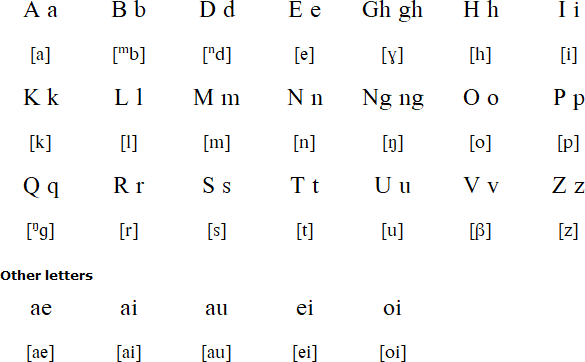Nduke is a member of the Northwest Solomonic branch of the Western Oceanic language family. It is spoken by about 3,000 people on Kolombangara Island in the Western Province of the Solomon Islands. It is spoken by people of all ages, however those under 40 years old tend to speak Nduke with less lexical richness. Solomon Pijin, the national language of the Solomon Islands is widely spoken on Kolombangara, and is replacing Nduke in some families.
Nduke is also known as Duke or Kolombangara. Native speakers call it Dughore, Ndughore or Kolei. It was first documented in 1908 by Arthur Maurice Hocart (1883-1939), an anthropologist from Guernsey. He developed an orthography for Nduke using the Latin alphabet, which was the basis for orthographies developed by Methodist and Seventh-day Adventist misionaries in 1917 and 1919. Recently a composite of those orthographies has emerged.

Download an alphabet chart for Nduke (Excel)
Information about Nduke | Numbers
Information about Nduke
https://en.wikipedia.org/wiki/Duke_language
http://www.language-archives.org/language/nke
https://glottolog.org/resource/languoid/id/duke1237
https://www.facebook.com/people/Nduke-Dictionary-Project/100065141755567/
Adzera, Ahamb, Äiwoo, Aneityum, Apma, Araki, Are, ’Auhelawa, Avava, Babatana, Bariai, Bola, Big Numbas, Buhutu, Bwaidoka, Caac, Cheke Holo, Dorig, Hiri Motu, Hiw, Hoava, Kakabai, Kaninuwa, Kokota, Kove, Kurti, Lakon, Lehali, Lenakel, Lewo, Lote, Lo-Toga, Löyöp, Manam, Marovo, Maskelynes, Mato, Mavea, Mono-Alu, Motu, Mussau-Emira, Mwotlap, Nafsan, Nahavaq, Namakura, Nanggu, Nduke, Neve‘ei, Neverver, Ninde, North Efate, Nume, Paamese, Papapana, Raga, Rotuman, Roviana, Sa, Sakao, Saliba, Siar, Sio, Ske, Sobei, Sursurunga, Tamambo, Tami, Teanu, Tigak, Tirax, Tolai, Touo, Ubir, Ughele, Uneapa, Vatlongos, Vitu, Vurës, Western Fijian, Yabem, Yapese
Languages written with the Latin alphabet
Page created: 12.02.24. Last modified: 12.02.24
[top]
You can support this site by Buying Me A Coffee, and if you like what you see on this page, you can use the buttons below to share it with people you know.

If you like this site and find it useful, you can support it by making a donation via PayPal or Patreon, or by contributing in other ways. Omniglot is how I make my living.
Note: all links on this site to Amazon.com, Amazon.co.uk
and Amazon.fr
are affiliate links. This means I earn a commission if you click on any of them and buy something. So by clicking on these links you can help to support this site.
[top]